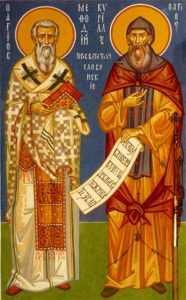 Before going on our Reformation Tour, I had been writing about work and what it mean to work inspired by the Holy Spirit.
Before going on our Reformation Tour, I had been writing about work and what it mean to work inspired by the Holy Spirit.
In preparing for our trip, as is my custom, I began reading about those who had shaped the history of the places we were going.
In doing so, I came across Cyril and Methodius.
Constantine of Thessalonica, who would become known as St. Cyril, and his brother Methodius were born in Thessalonica in the early part of the ninth century.
They were both well educated and engaged in scholarly pursuits.
Cyril and Methodius had recently returned from a successful mission in the Crimea, when Prince Rastislav of Great Moravia (now the Czech Republic and Slovakia) requested Byzantine Emperor Michael send missionaries to help his people, the Slavs.
At the time, the Slavs had a spoken language but did not have a written language. Ratislav wanted the Byzantines to help them develop a written language. Without a written language, higher learning and the real development of civilization is all but impossible.
Michael commissioned Cyril. It was a Herculean task, literally creating an alphabet, creating words to correspond with the spoken language, and then creating written words for which there were no corresponding spoken words. When Cyril expressed concern to the Emperor regarding the difficultly of the task, Emperor Michael replied, “If you desire it, God will grant it to you, He who gives to all who ask without doubting and opens up to those who knock.” So, Cyril accepted the task and got to work.
Cyril’s biographer and Methodius’s biographer, who both wrote within ten years of their subject’s deaths, tell a similar story. Cyril’s biographer writes:
“Cyril submitted and, having prayed with his associates, at once set to work. And God, who hears the prayers of his servants, soon revealed the script to him.”
Methodius’s biographer has a similar account, noting that after Cyril had fetched his brother Methodius,
” . . . . and those who were of the same spirit as themselves they applied themselves to prayer. And here God revealed the Slavic script to the Philosopher [Cyril], and he at once composed the letters and wrote the words.”
Interestingly philologists are baffled at how Cyril could have done it. They acknowledge the alphabet is very odd and resembles no other alphabet. Some have looked at a few of the letters in the alphabet in isolation and have argued some have a similarity to Samaritan, Hebrew, or Syriac but have been unable to provide any rational explanation for how Cyril came up with the alphabet. The bottom line is that there is no good earthly explanation.
This story is an excellent example of what it means to work empowered by the Holy Spirt. On July 4, 2017, I wrote about how working empowered by the Holy Spirit has at least three components: knowing, performing, and teaching. Here, Cyril seemed to experience all three, first seeing the alphabet, compiling it and a vocabulary, and teaching it to the Slavs.
Cyril and Methodius’s work resulted in a Slavic Renaissance. First and foremost the Gospels became accessible to the Slavs, but in addition higher learning; and in essence, civilization. Today Cyrillic is the alphabet used by more than 250 million people.
And all this happened because one man performed his job empowered by the Holy Spirit. GS

